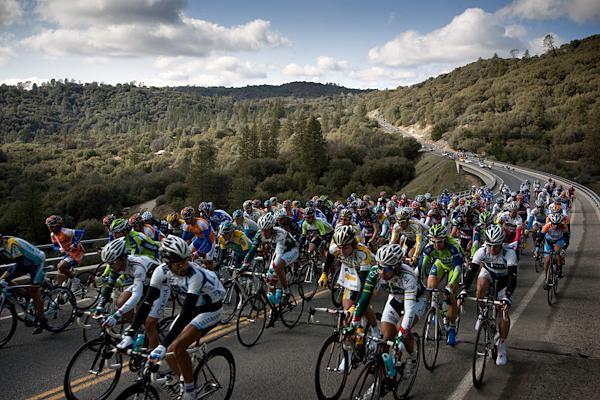Amgen's unlikely partnership with cycling
Cancer patient advocacy a focus for EPO maker

When Amgen was first announced as the title sponsor for the Tour of California in 2006, the irony wasn't lost on cycling's hardened cynics. After all, the biotech giant is one of the original companies to market EPO, the blood-booster that is a life saver for critically ill patients, but whose abuse in the sport has seriously harmed cycling's reputation.
So why would Amgen drop so much money into a bike race? The answer lies partly in the fact that the company is located in the heart of America's cycling hotbed and hundreds of its employees are avid bicycle enthusiasts, and partly with the company's mission to serve its main customers - people with serious illnesses like cancer.
Cyclingnews met with Dr. Steve Elliott, Amgen's scientific director, to learn a little more about the reasoning behind the company's sponsorship of the Tour of California and get his answer to the criticisms of the EPO-maker's partnership with cycling.
Dr. Elliott explained that the idea that anyone would use the drugs they were developing and producing in order to cheat at sports was not something that showed up on the company's radar early on.
"It's such an alien concept - we show up to work every day and try to find these medicines to treat this disease your friends, family and neighbours might have, and you're so consumed with that that it never occurs to you that somebody is going to go out and abuse this medicine," said Elliott. "It's so disturbing when that happens."
That naiveté ended nine years after EPO was first released when, during the 1998 Tour de France, the Festina scandal erupted. It had long been rumoured, but then became public that Epogen, Amgen's EPO drug, had made its way into the professional peloton and provided a performance advantage thanks to its ability to boost production of oxygen-carrying red blood cells in the body.
Dr. Elliott has since been frequently involved with helping the anti-doping authorities uncover illicit use of Amgen's therapeutics, including during the lead-up to the Salt Lake City Winter Olympic Games in 2002, when he worked with UCLA's Dr. Don Catlin to develop a test for the company's newer drug, Aranesp. The brand new test nabbed three athletes during the Games.
Get The Leadout Newsletter
The latest race content, interviews, features, reviews and expert buying guides, direct to your inbox!
Since then he's also travelled to Europe and Canada to collaborate with anti-doping authorities, and Amgen has given grants to anti-doping education and testing programs around the world.
While the main reason the company began its Tour of California sponsorship was to help further its corporate mission to serve the cancer community through their Breakaway from Cancer events at the race, another aspect is the platform the race provides to help educate the sporting world about the dangers of doping.
Dr. Elliott addressed the criticism of Amgen's sponsorship of the Tour of California through his unique position to help effect change in the sport by working with the authorities to help curb doping, and hopes cynics can place the blame where he thinks it belongs.
"I think if there's any one message, it is that we should get angry - not at the sport, not at Amgen, but at the person that cheated, and do something about it. Encourage the agencies to make tougher laws, give more sanctions. We shouldn't let people who cheat get away with it. We shouldn't hate the sport because there's someone who cheated in it, we should get them out."
"[Critics] tainted the way people thought about our sponsorship - [made it seem as if] we're promoting doping. It's a sad state of how we're thinking that a company that makes medicines and loves cycling would somehow be viewed as promoting doping because we make a medicine that someone is abusing. It's unfortunate that people think this way.
"We think about it in terms of our love for cycling, it's a fun sport, we want to encourage the sport to be clean, so we add our voice to this notion that you shouldn't be doping with our medicine. Who better to say that than the company that actually makes the medicine? I think our voice is one of the strongest ones, and yet there are some people who think this is an inappropriate thing to do."
Amgen is not the only drug maker who has cooperated with the anti-doping effort, and is part of an industry-wide push to help stop doping. In 2008, Roche, makers of Mircera (CERA) worked together with the anti-doping authorities to get a test in place in time to catch several riders using the new form of EPO during the Tour de France that year.
The anti-doping efforts at the Amgen Tour of California have also been stepped up this year. Last month, Tour of California organiser AEG and the United States Anti-doping Administration (USADA) announced a programme of pre-race profiling for domestic teams, as well as blood controls prior to the race for all riders, a push Amgen has supported.
And in the future, Amgen and the rest of the pharmaceutical industry have woken up to the reality that as new drugs enter clinical trials, they have to plan to help prevent them from being abused by athletes.
"Part of our responsibility is to think about possible abuse and be ready," Elliott said.

Laura Weislo has been with Cyclingnews since 2006 after making a switch from a career in science. As Managing Editor, she coordinates coverage for North American events and global news. As former elite-level road racer who dabbled in cyclo-cross and track, Laura has a passion for all three disciplines. When not working she likes to go camping and explore lesser traveled roads, paths and gravel tracks. Laura specialises in covering doping, anti-doping, UCI governance and performing data analysis.